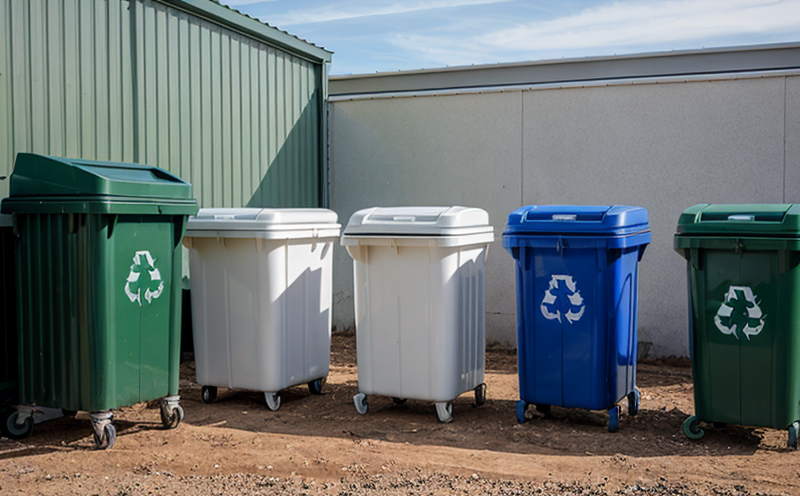ISO 18604 Packaging Recyclability Assessment
The ISO 18604 standard is a pivotal tool in the realm of sustainability and recycling testing. This international standard provides comprehensive guidelines for assessing the recyclability of packaging materials, ensuring that products meet environmental standards while also being economically viable and technically feasible.
The purpose behind ISO 18604 lies in addressing the growing concern over the environmental impact of packaging waste. By providing a standardized approach to recycleability assessment, this standard helps manufacturers design packaging that is easier to sort, process, and ultimately recycle at end-of-life.
To achieve effective recyclability assessments under ISO 18604, several key aspects must be considered:
- Material Composition: Understanding the chemical composition of materials is crucial. Packaging that contains multiple plastics or blends may complicate recycling processes.
- Design for Recycling: The design should facilitate easy sorting and processing at recycling facilities, reducing contamination risks during collection.
- Recycling Efficiency: Testing must evaluate how well the packaging can be processed in existing recycling systems. This includes assessing energy consumption and material quality post-recycling.
The process typically involves a series of tests to ensure that packaging materials meet specific criteria for recyclability. These tests may include:
- Sorting behavior testing: Evaluates how well different materials can be sorted during collection and processing.
- Material purity analysis: Ensures the recycled material remains pure, avoiding contamination from non-recyclable components.
- Energetic efficiency assessment: Measures the energy required to recycle the packaging compared to conventional methods.
The first step in conducting an ISO 18604 assessment is thorough specimen preparation. This involves selecting representative samples of the packaging material, ensuring they are free from contaminants and accurately reflect real-world conditions. Once prepared, these specimens undergo rigorous testing using advanced laboratory equipment, including near-infrared spectroscopy (NIRS) for material identification.
Post-testing analysis plays a critical role in determining compliance with ISO 18604 standards. Results must demonstrate that the packaging meets all specified criteria regarding recyclability. This includes meeting predefined thresholds for energy efficiency and ensuring minimal contamination during sorting processes.
For quality managers, compliance officers, R&D engineers, and procurement professionals involved in sustainable practices, understanding and implementing ISO 18604 is essential. It provides a roadmap towards creating more environmentally friendly packaging solutions while maintaining product integrity and functionality.
Eurolab Advantages
As a leading provider of ISO 18604 services, Eurolab offers unparalleled advantages that set us apart from competitors:
- Comprehensive Expertise: Our team comprises highly skilled professionals with deep knowledge in materials science and recycling technologies.
- State-of-the-Art Facilities: Equipped with cutting-edge laboratories, we ensure precise and reliable test results every time.
- Prompt Turnaround Times: Leveraging efficient processes and advanced technology, we deliver timely reports without compromising quality.
- Global Recognition: Eurolab’s certifications are widely recognized across industries, ensuring trust in our services worldwide.
- Sustainability Focus: We continuously strive to innovate and improve our methods, aligning closely with global sustainability goals.
Our commitment to excellence ensures that clients receive accurate assessments tailored specifically for their needs. With Eurolab, you can trust in reliable data that supports informed decision-making regarding sustainable packaging practices.
Quality and Reliability Assurance
The quality and reliability of ISO 18604 assessments conducted by Eurolab are paramount. We employ stringent quality control measures throughout our entire process to ensure accuracy and consistency:
- Method Validation: All testing methods undergo rigorous validation before use, ensuring they meet international standards.
- Calibration Protocols: Our instruments are regularly calibrated to maintain precision and accuracy.
- Data Integrity Checks: Comprehensive checks are performed on all data collected during assessments to prevent errors or anomalies.
- Repeatable Results: Consistent results across multiple tests validate the reliability of our findings.
In addition, Eurolab maintains a robust quality management system certified to ISO 9001:2015, ensuring continuous improvement and adherence to best practices. This commitment translates into trustworthiness for all stakeholders involved in packaging recyclability evaluations.
Environmental and Sustainability Contributions
The implementation of ISO 18604 standards through services provided by Eurolab makes a significant contribution towards environmental sustainability:
- Reduction in Waste: By promoting efficient recycling practices, we help reduce waste sent to landfills.
- Energy Savings: Assessments highlight opportunities for reducing energy consumption during the recycling process.
- Material Efficiency: Evaluations identify ways to improve material efficiency, minimizing resource depletion.
- Consumer Confidence: Providing transparent and accurate information fosters trust among consumers who value eco-friendly products.
Through these efforts, Eurolab plays a crucial role in advancing the circular economy concept. Our work supports organizations striving to minimize their environmental footprint while continuing to meet business objectives effectively.





